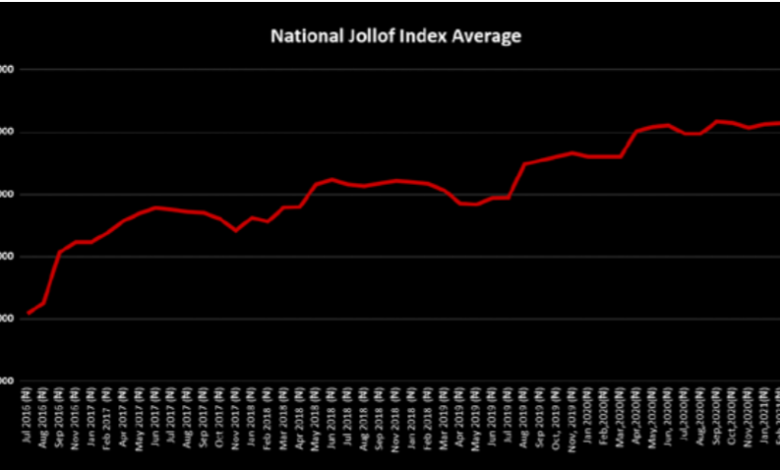National Average Cost Of Making Staple Meal Increases By 7.8% – Report
A new report has revealed that the price of making the Nigerian staple meal, Jollof Rice, has increased by 7.8% due to several economic factors.

Economic growth regression, the COVID-19 pandemic, and government policies have exacerbated food insecurity in Nigeria, as the prices of everyday products continue to rise in Nigeria.
This development was noted in a new report by SBM Intelligence, titled; ‘The SBM Jollof Index, Slippery Slope, Q1 2021.’ The report analysed food inflation and insecurity in Nigeria, using the cost of making Nigeria’s most popular staple meal, Jollof Rice, as a case study.
According to the report, “the average cost of making a pot of jollof rice rose by 7.8% between March 2020 and March 2021. This period saw significant events that have greatly impacted food prices; The COVID-19 lockdown from March to May, the border closure and forex restriction policies in August were consolidated by increased energy tariffs in September 2020.”
It noted also that “while the pandemic and the restriction of forex for importation (caused by falling oil prices) are external triggers, the prolonged border closure and increased energy tariffs are internal contributors.”
“In addition, protests against police brutality and the government response which brought the main consumer markets of Lagos and Abuja to a standstill for parts of October 2020, disrupted agricultural supply chains and the movement of people and goods, piling more pressure on food prices.”
Additionally, from October 2020 to March 2021, according to the report, “the effect of these events have lingered, despite Nigeria’s re-opening of its land borders in December of last year. The cost of a bag of rice has only slightly dropped by a margin of N1,000 – N3,000 depending on the market, but this has not translated into a significant reduction in the cost of making jollof rice especially for the majority of Nigerians who buy from retailers.”
“Reduced local production, exchange rate fluctuations, poor harvest due to adverse weather conditions, high cost of energy (electricity/ transport) tariffs are some of the reasons why food prices have remained high. Some of the Jollof rice ingredients “rice, onions, tomatoes, have witnessed reduced local production because of protracted conflicts and terrorist attacks on farmers.”
“Out of the 11 main rice-producing states in the country, Benue, Borno, Ebonyi and Kaduna have witnessed attacks on farmers with the most gruesome being the execution of about 110 rice farmers in Borno in November 2020. As a result of these incidents, several farmers are leaving the countryside and moving to the cities to take up menial jobs.”
“The average cost of making a pot of jollof rice in Nigeria increased to N7400 from N7167 in the last quarter.”
Nigeria’s food insecurity remains a subject of national concern, as the country continues to face insecurity across all six regions, with no promise of relocated conflict survivors returning to farms for fear of being killed.
Support Our Journalism
There are millions of ordinary people affected by conflict in Africa whose stories are missing in the mainstream media. HumAngle is determined to tell those challenging and under-reported stories, hoping that the people impacted by these conflicts will find the safety and security they deserve.
To ensure that we continue to provide public service coverage, we have a small favour to ask you. We want you to be part of our journalistic endeavour by contributing a token to us.
Your donation will further promote a robust, free, and independent media.
Donate HereStay Closer To The Stories That Matter




